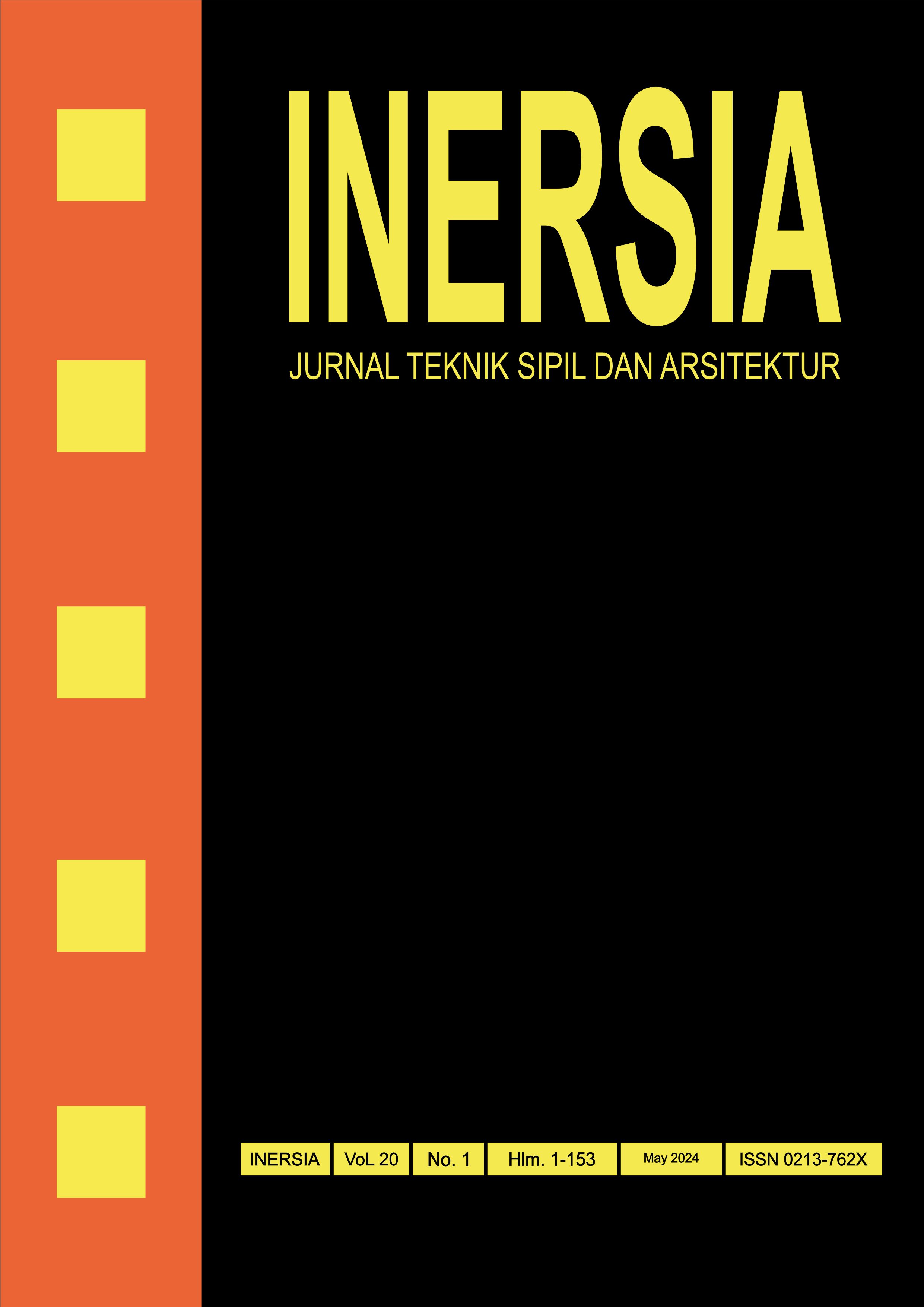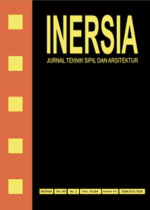Effects of Gravel Percentage to Compaction Density and Stability of Embankment
DOI:
https://doi.org/10.21831/inersia.v20i1.65825Keywords:
Sand cone, Compaction density, Embankment stabilityAbstract
Embankments are frequently used in the construction of road, railway, airport, dams and other types infrastructure. Soil compaction is a crucial part of the construction process of embankment. Thus, soil compaction needs to be conducted and investigated in such a way so embankment will not experience large settlement that could lead to collapse. Generally, soil compaction density testing is performed using the sand cone method according to ASTM D-1556. The material used in this test is not carefully considered, which may lead to inaccurate results. In this study, the sand cone correction test according to ASTM D-4718 which consider the percentage of gravel is established to identify the compaction density of embankment and the effect to its stability. 16 secondary data of compaction density have been collected from the construction of embankment. According to the data, the compaction density of the embankment has met the specifications. The relationship between the gravel percentage and the compaction density is obtained. With a determination coefficient (R2) value of 0.805, it can be understood that these two variables have a highly significant correlation. Furthermore, to understand the relationship between the compaction density and the stability of the embankment, a slope stability analysis was conducted on the embankment using the Fellenius method. The result shows that when the compaction density of the embankment meet the specifications, embankment is stable with the safety factor (SF) of 1.511. Furthermore, both variables have a very strong relationship. The safety factor of the embankment is increased as the compaction density increases.
References
R. D. Siregar, J. Sarifah, and D. Tanjung, "Analisa Kepadatan Tanah Menggunakan Metode Sand Cone Pada Pembangunan Relokasi Jalan Bendungan Lau Simeme Paket II Kab. Deli Serdang Sumatera Utara," Bul. Utama Tek., vol. 16, no. 2, pp. 157–162, 2021.
I. Hadijah, "Analisis Kepadatan Lapangan Dengan Sand Cone Pada Kegiatan Peningkatan Struktur Jalan Tegineneng –Batas Kota Metro," TAPAK (Teknologi Apl. Konstr. J. Progr. Stud. Tek. Sipil, vol. 4, no. 2, pp. 87–92, 2016.
ASTMD1556-07, "Standard Test Method for Density and Unit Weight of Soil in Place by the Sand-Cone," Changes, vol. 03, pp. 1–7, 1995.
ASTMD4718, "Standard Practice for Correction of Unit Weight and Water Content for Soils," Methods, vol. 04, no. Reapproved, pp. 4–6, 2001, doi: 10.1520/D4718.
R. M. R. Mia Anggreini, Aprianto, "Analisis daya dukung lapisan tanah dasar di politeknik negeri ketapang berdasarkan korelasi cbr konvensional dan cbr lapangan 1)," pp. 1–10, 2022.
B. V Helmi, Aprianto, "Kolerasi Nilai California Bearing Ratio (CBR) Lapangan Dengan Menggunakan Alat Dynamic Cone Penetrometer (DPC) dan California Bearing Ratio (CBR) Mekanis," JeLAST J. PWK, Laut, Sipil, Tambang, vol. 1, no. 1, pp. 1–12, 2016.
W. . Safitri, "Analisis Korelasi Dalam Menentukan Hubungan Antara Kejadian Demam Berdarah Dengue Dengan Kepadatan Penduduk Di Kota Surabaya Pada Tahun 2012 - 2014," J. Kesehat. Masy., vol. 1, no. 3, pp. 1–9, 2014.
O. B. . S. Violetta Gabriella Margaretha Pangemanan A.E Turangan, "Analisis Kestabilan Lereng Dengan Metode Fellenius (Studi Kasus: Kawasan Citraland)," J. Sipil Statik, vol. 2, no. 1, pp. 22–28, 2014, [Online]. Available: http://ejournal.unsrat.ac.id/index.php/jss/article/view/3920
Das B.M & Sobhan, "Priciples of Geotechnical Engineering," Cengage Learn., p. 819, 2018.
SNI-8460, "Persyaratan Perancangan Geoteknik," Persyaratan Peranc. Geotek., vol. 8460, p. 2017, 2017.
The Boeing Company, "Airplane characteristics for airport planning B737," Econ. J., vol. 80, no. 318, p. 307, 2013, [Online]. Available: https://academic.oup.com/ej/article/80/318/307-322/5236217
Darayani.E.D dkk, "Analisis Beban Ekuivalen Roda Tunggal Pesawat Boeing 777-300Er Pada Perkerasan Lentur Runway Bandar Udara Dengan Metode Elemen Hingga," Pros. Simp. Forum Stud. Transp. antar Perguru. Tinggi ke-21, pp. 19–20, 2018.
Hidayah & Gratia, "Program analisis stabilitas lereng," 2007, [Online]. Available: http://eprints.undip.ac.id/33864/1/1818.pdf
M. Ziccarelli and M. Rosone, "Stability of embankments resting on foundation soils with a weak layer," Geosci., vol. 11, no. 2, pp. 1–16, 2021, doi: 10.3390/geosciences11020086.
Downloads
Published
How to Cite
Issue
Section
License
Authors who publish with INERSIA journal agree to the following terms:
- Authors retain copyright and grant the INERSIA journal right of first publication with the work simultaneously licensed under Creative Commons Attribution License (CC BY 4.0) that allows others to share the work with an acknowledgment of the work's authorship and initial publication in this journal.
- Authors can enter into separate, additional contractual arrangements for the non-exclusive distribution of the published version of the work (e.g., post it to an institutional repository or edit it in a book), with an acknowledgment of its initial publication in this journal.
- Authors are permitted and encouraged to post their work online (e.g., in institutional repositories or on their website) before and during the submission process, as it can lead to productive exchanges, as well as earlier and greater citation of published work.

INERSIA by https://journal.uny.ac.id/index.php/inersia was distributed under a Creative Commons Attribution 4.0 International License











